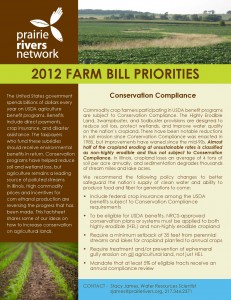 The Farm Bill is a massive piece of federal legislation that is reviewed and reauthorized approximately every 5 years. It includes government programs for nutrition, rural development, energy, agricultural production, and conservation. Prairie Rivers Network seeks to influence the Farm Bill because it contains agricultural conservation programs that improve water quality. These programs have produced significant environmental benefits by funding or requiring conservation practices on farms and cultivating an environmental ethic among farmers.
The Farm Bill is a massive piece of federal legislation that is reviewed and reauthorized approximately every 5 years. It includes government programs for nutrition, rural development, energy, agricultural production, and conservation. Prairie Rivers Network seeks to influence the Farm Bill because it contains agricultural conservation programs that improve water quality. These programs have produced significant environmental benefits by funding or requiring conservation practices on farms and cultivating an environmental ethic among farmers.
Prairie Rivers Network has produced a factsheet on our conservation priorities for the 2012 Farm Bill. Our priorities include:
- Ensure the Mississippi River Basin Healthy Watersheds Initiative and other targeted initiatives remain a growing part of Farm Bill conservation programs
- Make federal crop insurance one of the Farm Bill benefit programs subject to Conservation Compliance
- Require farmers who receive government benefits to adopt additional conservation measures.
Our priorities are in line with major environmental organizations such as National Wildlife Federation, Izaak Walton League, and Environmental Working Group. We have shared this factsheet with the agricultural staffers of the Illinois delegation to Congress. Later this year, we will travel to D.C. to meet in person with our legislators.
The Farm Bill contains two vital conservation components. The first is Conservation Compliance, a quasi-regulatory provision that requires farmers who receive certain government subsidies to control soil erosion and preserve wetlands. Conservation Compliance has resulted in significant reductions in soil loss and saved thousands of wetlands from the plow. We see this conservation requirement as a fair exchange for the billions of dollars in subsidies that farmers receive from taxpayers.
The second conservation component of the Farm Bill is the numerous voluntary cost-share and easement programs run by the U.S. Department of Agriculture. Programs such as the Conservation Reserve Program and Wetlands Reserve Program pay farmers to retire sensitive lands from production and restore them to nature. Other programs such as the Conservation Stewardship Program and Environmental Quality Incentives Program pay farmers to do conservation on land that is actively farmed. Together, these voluntary programs have greatly increased farmer adoption of conservation practices and reduced agricultural runoff and water pollution.
The 2012 Farm Bill is already taking shape in Washington, D.C. The conservation community expects fewer dollars to be made available for conservation, so we will be fighting for the most important programs and against disproportionate cuts to conservation. In the face of a smaller voluntary conservation purse, now is the time to target limited resources to where they are needed most and expand Conservation Compliance to include more farmland.
As a private citizen, you can help shape the Farm Bill! We encourage you to share your views with your U.S. Representative and Senator, whether in person or via email, letter, or phone. Some legislators are more swayed by constituents from their own districts than regional or national organizations. Please contact our office if you have any questions about the Farm Bill or how to contact your legislators.







